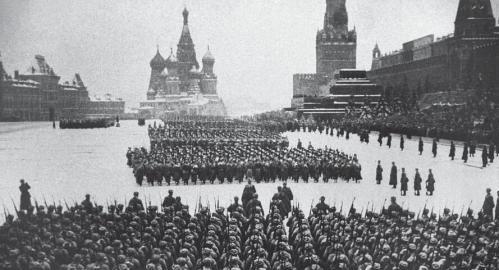What is history: it is the echo of the past to the future, the reflection of the future on the past. - Hugo
In 1941, the Soviet winter was exceptionally cold, and in October it was already snowy and the roads were muddy. On November 7 of that year, Stalin held the famous "Red Square Military Parade" in Red Square, vowing to coexist with Moscow.
Moscow, the capital of the Soviet Union, the political center, the symbol of the country, and at the same time an important transportation hub of the Soviet Union.
The armored vanguard of Nazi Germany Guderian could even see the five-pointed star on Moscow's Red Square at the height of the battle, but the bad weather made it difficult for the Germans to advance half a step.
With the continuous emergence of fresh forces in the Soviet Red Army, the Nazi Iron Cavalry was defeated under the city of Moscow, and the Blitzkrieg was declared a failure.

We can say that if the Germans had captured Moscow before winter had arrived, it would have been a near-devastating blow to the Soviets.
First, in the ideological Soviet Union, the loss of the capital would be a serious demoralization.
Secondly, Moscow, as the hub of soviet north-south communication, can easily transfer troops from north to south by occupying this place, and if Germany takes this place, it can connect the two assault groups in the north and south into a line, and the Soviets will lose the possibility of echoing north and south. (Later, in the major battles of the Soviet-German battlefield, the Soviets were able to dispatch troops at will, which had a lot to do with the Moscow transportation hub.)
Third, due to Moscow's important strategic position and political significance, after the occupation of Moscow, the entire northern and southern parts of the Soviet Union will be completely isolated, and the entire Soviet-German war will be completely reversed.
Why, then, did the Germans lose Moscow, which was so close at hand?
In addition to the stubborn resistance of the Soviet people and the heroes of the Soviet Red Army, the weather was undoubtedly the greatest enemy of the Germans.
At that time, the supply conditions of German equipment were still the standard in spring and autumn, and even if a few troops supplemented the winter supply, it was pitiful. The German tanks could not be started, the guns could not be untied, the planes could not take off, and even the food and accommodation were blocked by ice and snow.
The Soviets, especially the elite divisions urgently transferred from the Far East, all their training was a course of ice and snow, and their equipment was designed exactly according to the standards of the harsh winter.
In this situation, all the Tactics of the Germans were useless, and the battles that should have been quick and decisive turned into a brutal tug-of-war, and in the end, the Germans were pushed out of the city of Moscow by the Soviets.
So why didn't the Germans attack the Soviet Union earlier? Wouldn't it be better to avoid the terrible winter of the USSR and end the battle in the summer and autumn?
In fact, the Germans took this step into account.
Nazi Germany's attack on the Soviet Union was on June 22, 1941, and the attack near Moscow was about the end of September and the beginning of October, by which time the weather in Germany was already very bad.
In fact, Hitler's initial hope was to launch an all-out offensive against the Soviet Union in mid-May 1941, and if this plan had been followed, the Germans would have attacked the vicinity of Moscow at the end of August and the beginning of September, so that Guderian's armored forces would have had a full month to raid Moscow.
In clear weather, the Soviets may have a hard time stopping the Nazi blitzkrieg, and Moscow may be lost!
However, the balance of fate tilted in May 1941, when a national move inadvertently saved the Soviets!
That country is Yugoslavia. A coup d'état took place in Yugoslavia at the end of March 1941, making enemies of Germany.
Hitler's impulsive mind was greatly ignited, and he immediately dispatched troops to invade Yugoslavia in an all-round way, and as a result, the battle was over after more than ten days, and Yugoslavia was defeated and surrendered.
Hitler's attack on Yugoslavia went well, but it was precisely this war that forced the Germans to postpone the attack on the Soviet Union.
It was postponed for more than a month! And this precious time has become the key to influencing the world!
After the defeat of Yugoslavia, it was used as a puppet by Hitler, but the Yugoslavs did not completely submit, and the Yugoslav resistance led by Tito persisted until the end of the war and established the Yugoslav People's Republic.
It was the social state that had saved the Soviet Union that was ostracized and isolated by Stalin because it opposed the hegemonic behavior of the Soviet Union.